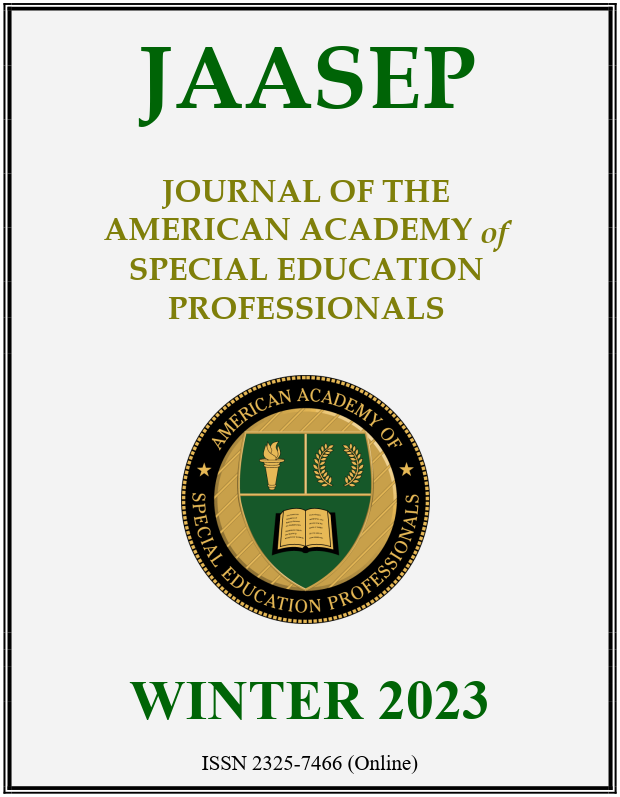Life Skill Programs: An Exploratory Survey of School Based Programming in the Public High School Setting
AshmadiGatab, T., Shayan, N., Tazangi, R.M. & Taheri, M. (2011). Students’ life quality prediction based on life skills. Procedia Social and Behavioral Sciences, 30, 1980-1982. DOI: https://doi.org/10.1016/j.sbspro.2011.10.384
Alwell, M. & Cobb, B. (2009). Functional life skills curricular interventions for youth with disabilities: A systematic review. Career Development for Exceptional Disabilities, 32(2), 82-93. DOI: https://doi.org/10.1177/0885728809336656
Arnold-Reid, G.S., Schloss, P.J. & Alper, S. (1997). Teaching meal planning to youth with mental retardation in natural settings. Remedial and Special Education, 18(3), 166-173. doi:10.1177/074193259701800305 DOI: https://doi.org/10.1177/074193259701800305
Bouck, E.C. (2010). Reports of life skills training for students with intellectual disabilities in and out of school. Journal of Intellectual Disability Research, 54, 1093-1103. doi:10.1111/j.1365-2788.2010.01339.x DOI: https://doi.org/10.1111/j.1365-2788.2010.01339.x
Bobzien, J.L. (2014). Academic or functional life skills? Using behaviors associated with happiness to guide instruction for students with profound/multiple disabilities. Education Research International, 2014(710816). http://dx.doi.org/10.1155/2014/710816 DOI: https://doi.org/10.1155/2014/710816
Browder, D.M., Wood, L., Thompson, J. & Ribuffo, C. (2014). Evidence-based practices for students with severe disabilities (Document No. IC-3). Retrieved from University of Florida, Collaboration for Effective Educator, Development, Accountability, and Reform Center. website: http://ceedar.education.ufl.edu/tools/innovation-configurations/
Cronin, M. (1996). Life skills curricula for students with learning disabilities: A review of the literature. Journal of Learning Disabilities, 29(1), 128-142. DOI: https://doi.org/10.1177/002221949602900108
D’Souza, D. (2018). Effect of situated learning model on critical problem solving skills among higher secondary pupils. Journal on School Educational Technology, 14(1), 27-34. DOI: https://doi.org/10.26634/jsch.14.1.14381
Duff, C., McPherson, A., King, G., & Kingsnorth, S. (2020). Deconstructing residential immersive life skills programming through a pedagogical lens: Mechanisms that can facilitate learning for youth with disabilities. Journal of Research in Special Education Needs, (20)2, 121-129. DOI: https://doi.org/10.1111/1471-3802.12470
King, G., Kingsnorth, S., McPherson, A., Jones-Galley, K., Pinto, M., Fellin, M., Timbrell, N. & Savage, D. (2016). Residential immersive life skills programs for youth with physical disabilities: A pilot study of program opportunities, intervention strategies, and youth experiences. Resarch in Developmental Disabilities, 55, 242-255. DOI: https://doi.org/10.1016/j.ridd.2016.04.014
Kingsnorth, S., Healy, H. & Macarthur, C. (2007). Preparing for adulthood: A systematic review of life skill programs for youth with physical disabilities. Journal of Adolescent Health, 41, 323-332. DOI: https://doi.org/10.1016/j.jadohealth.2007.06.007
Kingsnorth, S., Rudzik, A.E., King, G. & McPherson, A.C. (2019). Residential immersive life skills programs for youth with disabilities: a case study of youth developmental trajectories of personal growth and caregiver perspectives. BMC Pediatrics, 19, 1-32. DOI: https://doi.org/10.1186/s12887-019-1793-z
McPherson, A., King, G., Rudzik, A., Kingsnorth, S., Gorter, J.W. & Ontario Independence Program Research Team. (2016). Optimizing life success through residential immersive life skills programs for youth with disabilities: study protocol of a mixed-methods, prospective, comparative cohort study. BMC Pediatrics, 16, 1-9. DOI: https://doi.org/10.1186/s12887-016-0694-7
McPherson, A., Rudzik, A., Kingsnorth, S., King, G., Willem Gorter, J., & Morrison, A. (2018). “Ready to take on the world”: Experiences and understandings of independence after attending residential immersive life skills programs for youth with physical disabilities. Developmental Neurorehabilitation, 21(2). http://dx.doi.org/10.3109/17518423.2016.1141254 DOI: https://doi.org/10.3109/17518423.2016.1141254
Meyers, S. (2011). Life skills training through situated learning experiences: An alternative instructional model. International Journel of Special Education, 26(3), 142-149.
National Disability Institute. (2020). The extra costs of living with a disability in the U.S.-Resetting the policy table. NDI.org. https://www.nationaldisabilityinstitute.org/wp-content/uploads/2020/10/extra-costs-living-with-disability-brief.pdf
New Hampshire Fiscal Policy Institute. (2019). The state budget for fiscal year2 2020 and 2021. NHFPI.org. https://nhfpi.org/resource/the-state-budget-for-fiscal-years-2020-and-2021/
Nietupski, J., Hamre-Nietupski, S., Curtin, S., and Shrikanth, K. (1997). A review of curricular research in severe disabilities from 1976 to 1995 in six selected journals. The Journal of Special Education, 31(1), 36-55. DOI: https://doi.org/10.1177/002246699703100104
Office of Special Education and Rehabilitative Services United States Department of Education. (2020). A transition guide to postsecondary education and employment for students and youth with disabilities. Washington, D.C. Powers, R. (Ed.). 2020. E-learning essentials 2020. Power Learning Solutions. https://elearning2020.pressbooks.com/chapter/situated-learning-theory/
Sheppard, L. & Unsworth, C. (2011). Developing skills in everyday activities and self-determination in adolescents with intellectual and developmental disabilities. Remedial and Special Education, 32(5), 393-405. DOI: https://doi.org/10.1177/0741932510362223
White P.H. (1997). Success on the road to adulthood. Issues and hurdles for adolescents with disabilities. Rheumatic Diease Clinics, 23(3), 697-707. doi:10.1016/s0889-857x(05)70353-7. DOI: https://doi.org/10.1016/S0889-857X(05)70353-7
Downloads
Article Information
- Article Type Articles
- Submitted January 12, 2023
- Published February 15, 2023
- Issue Winter 2023
- Section Articles
